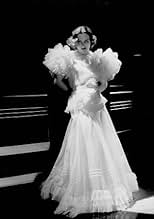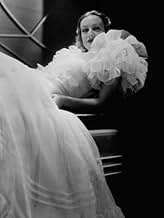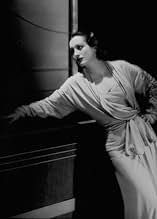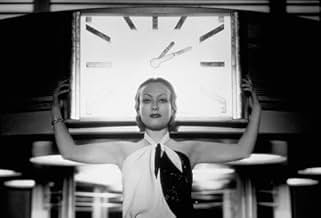Adicionar um enredo no seu idiomaA socialite begins a shipboard romance with a wealthy man, but is blackmailed by a former lover.A socialite begins a shipboard romance with a wealthy man, but is blackmailed by a former lover.A socialite begins a shipboard romance with a wealthy man, but is blackmailed by a former lover.
- Direção
- Roteiristas
- Artistas
- Prêmios
- 4 vitórias no total
Sidney Bracey
- Waiter
- (não creditado)
Edward LeSaint
- Dr. Sanders
- (não creditado)
Edgar Norton
- Darrow's Butler
- (não creditado)
Lee Phelps
- Dennis, Darrow's Chauffeur
- (não creditado)
C. Montague Shaw
- Ship's Officer at Christmas Party
- (não creditado)
Harry Stubbs
- Ship's Steward
- (não creditado)
Charles Williams
- Reporter
- (não creditado)
- Direção
- Roteiristas
- Elenco e equipe completos
- Produção, bilheteria e muito mais no IMDbPro
Avaliações em destaque
Letty Lynton (Joan Crawford) had men coming out of her ears. Everywhere she went men were clambering for her. One particular man, Emile Renaul (Nils Asther), whom she met abroad, was determined to possess her at all costs. She was once madly in love with him, then his veneer finish slowly faded and she was no longer in love with him, yet he was certainly still in love with (or infatuated with) her.
Letty peeled free of Emile in Rio de Janeiro and headed home for New York. On the ship she met Jerry (Robert Montgomery) who'd also fall in love with her. By the end of their two week voyage they were engaged to be married. Things got dicey for Letty when Emile was waiting at the dock for her in New York. Now she had to figure out a way to push Emile away for good while not letting on to Jerry she had such a relationship.
In this movie Letty was painted as the sympathetic character. She'd had a fling and was now indefinitely tied to this man whom she loved no more. The drama and suspense wasn't that of a "Fatal Attraction" or "Sleeping with the Enemy" in that Emile was going to do her bodily harm, the drama and suspense was in his ability to expose Letty. She was from a wealthy upstanding family and in the 30's, as I have learned, image is everything to high society. Letty's image would've been indelibly tarnished if Emile revealed to the world their tryst.
The problem I had with the "drama" was that I didn't see it as that big of a deal. Letty didn't want to lose Jerry, hence she wanted to keep Emile a secret. We, as the viewers, were supposed to feel the pain, angst, and desperation Letty had as she sought to free herself from Emile. I just couldn't feel it. I agree, it sucked to be in her position, but a big part of me was thinking, "Cut him off and deal with whatever he decides to reveal." I thought that because A.) I'm sure that the embarrassment would only be temporary B.) I believed Jerry would stick around and C.) Letty and Jerry's relationship never moved me. They met on a boat, had some good times, and decided to marry. The relationship was too simple for me to have any strong feelings about its survival.
Letty would deal with things her own way and find out just how much love she had, or didn't have, from Jerry.
Letty peeled free of Emile in Rio de Janeiro and headed home for New York. On the ship she met Jerry (Robert Montgomery) who'd also fall in love with her. By the end of their two week voyage they were engaged to be married. Things got dicey for Letty when Emile was waiting at the dock for her in New York. Now she had to figure out a way to push Emile away for good while not letting on to Jerry she had such a relationship.
In this movie Letty was painted as the sympathetic character. She'd had a fling and was now indefinitely tied to this man whom she loved no more. The drama and suspense wasn't that of a "Fatal Attraction" or "Sleeping with the Enemy" in that Emile was going to do her bodily harm, the drama and suspense was in his ability to expose Letty. She was from a wealthy upstanding family and in the 30's, as I have learned, image is everything to high society. Letty's image would've been indelibly tarnished if Emile revealed to the world their tryst.
The problem I had with the "drama" was that I didn't see it as that big of a deal. Letty didn't want to lose Jerry, hence she wanted to keep Emile a secret. We, as the viewers, were supposed to feel the pain, angst, and desperation Letty had as she sought to free herself from Emile. I just couldn't feel it. I agree, it sucked to be in her position, but a big part of me was thinking, "Cut him off and deal with whatever he decides to reveal." I thought that because A.) I'm sure that the embarrassment would only be temporary B.) I believed Jerry would stick around and C.) Letty and Jerry's relationship never moved me. They met on a boat, had some good times, and decided to marry. The relationship was too simple for me to have any strong feelings about its survival.
Letty would deal with things her own way and find out just how much love she had, or didn't have, from Jerry.
This is one of those "mythic" films, the 1932 Joan Crawford vehicle not available anywhere, not even for TV broadcasting, because it's been in a legal tangle for decades and decades; the film in which Crawford wore one of the most famous outfits ever displayed on screen, a beautiful Adrian creation, a white evening dress which was copied in its time and sold to eager female fans in Department Stores along the United States.
In this glossy film, Crawford plays the title role, a rich and spoiled heiress, who's been living the "wild life" in Montevideo, the capital city of Uruguay with debonair man-of-the-world Emile Rénaul, played by Nils Asther only to regret it when clean-cut Jerry Darrow (Robert Montgomery) comes into her life.
This is a star-vehicle all the way, with Crawford being photographed in the most ravishing poses, positions, from the best angles; much care was put in the in the lighting and her make-up & wardrobe. Perhaps this is one of the films in which I've seen Crawford at her prettiest and sexiest, wearing a chain of exquisite, sophisticated Adrian designed evening dresses and suits, furs et al, all carefully designed to conceal her broad shoulders, which later became a trademark of hers. At this time she had not fully developed into the dramatic actress she later became, but in spite of some heavy melodramatics, her performance is good.
Her co-star Robert Montgomery has little to do in comparison but being well-bred and nice and he is good, as usual, at it. Nils Asther is the "heavy" here and being a Swedish, believably interprets an European, evil, magnate who doesn't want Letty let go; maybe his style of playing the continental lover (sometimes displaying heavy emoting) may seem somewhat artificial to modern audiences, but in all he's OK as the villain, considering it was filmed in 1932.
One of the greatest rewards of the films is watching seasoned pros as Lewis Stone, May Robson, Louise Closser-Hale and Emma Dunn playing expertly their secondary roles. Robson is magnificent as Crawford's long-suffering dowager mother; Closser-Hale endearing as Crawford's loving personal traveling companion and maid; Emma Dunn, very sweet as Montgomery's mother and Lewis Stone at his usual "knows-best" as a D.A.
It is a shame that this film is not available for everybody to see, because it's good and part of America's Cinematic inheritance and history and should not be prevented from airing because of some 70 years-old legal entanglement. I'm grateful of having had the chance of buying a fair-quality copy from a private collector, but I would like to have the chance of seeing a sharp, clear, pristine transfer of the notorious "Letty Lynton".
In this glossy film, Crawford plays the title role, a rich and spoiled heiress, who's been living the "wild life" in Montevideo, the capital city of Uruguay with debonair man-of-the-world Emile Rénaul, played by Nils Asther only to regret it when clean-cut Jerry Darrow (Robert Montgomery) comes into her life.
This is a star-vehicle all the way, with Crawford being photographed in the most ravishing poses, positions, from the best angles; much care was put in the in the lighting and her make-up & wardrobe. Perhaps this is one of the films in which I've seen Crawford at her prettiest and sexiest, wearing a chain of exquisite, sophisticated Adrian designed evening dresses and suits, furs et al, all carefully designed to conceal her broad shoulders, which later became a trademark of hers. At this time she had not fully developed into the dramatic actress she later became, but in spite of some heavy melodramatics, her performance is good.
Her co-star Robert Montgomery has little to do in comparison but being well-bred and nice and he is good, as usual, at it. Nils Asther is the "heavy" here and being a Swedish, believably interprets an European, evil, magnate who doesn't want Letty let go; maybe his style of playing the continental lover (sometimes displaying heavy emoting) may seem somewhat artificial to modern audiences, but in all he's OK as the villain, considering it was filmed in 1932.
One of the greatest rewards of the films is watching seasoned pros as Lewis Stone, May Robson, Louise Closser-Hale and Emma Dunn playing expertly their secondary roles. Robson is magnificent as Crawford's long-suffering dowager mother; Closser-Hale endearing as Crawford's loving personal traveling companion and maid; Emma Dunn, very sweet as Montgomery's mother and Lewis Stone at his usual "knows-best" as a D.A.
It is a shame that this film is not available for everybody to see, because it's good and part of America's Cinematic inheritance and history and should not be prevented from airing because of some 70 years-old legal entanglement. I'm grateful of having had the chance of buying a fair-quality copy from a private collector, but I would like to have the chance of seeing a sharp, clear, pristine transfer of the notorious "Letty Lynton".
Long unreleased (and it's still hard to find a decent print), and thus notorious, "Letty Lynton" does not quite live up to this notoriety. It does have a great ending, the kind of pre-code ending that makes you want to sit up and clap, and a hard-to-watch scene of Joan Crawford being slapped around by a man, but otherwise it's an undistinguished story, unimaginatively presented. **1/2 out of 4.
In Letty Lynton Joan Crawford in the title role abandons the shopgirl roles she
was famous for. Here she's quite the rich heiress and as the story opens she's
sailing home to New York after giving Nils Asther the air.
Half of Letty Lynton takes place aboard ship and it is there that she meets and falls for the equally rich Robert Montgomery. By the time the boat arrives in New York these two are ready to be wed and they break the news to the parents.
But Asther is persistent and he wants her back because no woman gives him the brush. It leads to some real trouble for Crawford.
It's always been of interest to me how the movie going public just ate up stories like this of the very rich for whom the Great Depression was not touching in the slightest. The only relatively poor people among the main players are District Attorney Lewis Stone and Crawford's maid Louise Closser Hale who is more of a confidante than her stern mother May Robson.
Sex was not the only thing censored by The Code when it was promulgated for the film industry. The actions of several people would not be tolerated when Crawford does get herself into a nice jackpot as she does in and as Letty Lynton.
Joan Crawford's legion of fans will approve of this Depression Era romantic melodrama.
Half of Letty Lynton takes place aboard ship and it is there that she meets and falls for the equally rich Robert Montgomery. By the time the boat arrives in New York these two are ready to be wed and they break the news to the parents.
But Asther is persistent and he wants her back because no woman gives him the brush. It leads to some real trouble for Crawford.
It's always been of interest to me how the movie going public just ate up stories like this of the very rich for whom the Great Depression was not touching in the slightest. The only relatively poor people among the main players are District Attorney Lewis Stone and Crawford's maid Louise Closser Hale who is more of a confidante than her stern mother May Robson.
Sex was not the only thing censored by The Code when it was promulgated for the film industry. The actions of several people would not be tolerated when Crawford does get herself into a nice jackpot as she does in and as Letty Lynton.
Joan Crawford's legion of fans will approve of this Depression Era romantic melodrama.
... unlike so many lost or unavailable films. The plot initially seems not so unusual, especially for a Joan Crawford MGM vehicle of the 1930's. Joan plays a fabulously wealthy playgirl living in South America who decides to return home for a multitude of reasons - she wants to turn over a new leaf, she wants to make up with the mother (May Robson) who has been pushing her away all her life, but most of all she wants to get out of the grasp of a possessive lover (Nils Asther) that is smothering her and objectifying her to the point that she is frightened. She takes a ship home to New York, and on the way there falls in love with the charming heir Hale Darrow (Robert Montgomery). The two become engaged with the press waiting to snap their pictures as the boat docks, but as the picture is snapped, what does Letty see but the possessive lover she thought she left in South America, literally licking his chops for her and waiting for her to land.
Young Darrow knows nothing of Letty's past, Letty's mom still wants nothing to do with her, and as for her old lover, he's demanding she continue the affair or else he will publicize some torrid love letters she wrote. How does this all turn out? Quite unexpectedly, I'll tell you that much and I'll also tell you, thank goodness for precode where justice in the movies - as in life - didn't always have the predictable nature of a form letter like it did after 1934.
MGM threw its A-list talent at this one including Joan's gowns by Adrian, Lewis Stone with a short but important part at the end, and some first class character actors. The only thing that doesn't ring quite true is May Robson as Joan's mother. Robson's acting and characterization are perfect, but she was almost 50 years older than Joan, looks it, and it just doesn't seem plausible that they could be mother and daughter with that age difference staring you in the face. Still it's a minor quibble and I'd highly recommend watching it if you ever get the opportunity.
Young Darrow knows nothing of Letty's past, Letty's mom still wants nothing to do with her, and as for her old lover, he's demanding she continue the affair or else he will publicize some torrid love letters she wrote. How does this all turn out? Quite unexpectedly, I'll tell you that much and I'll also tell you, thank goodness for precode where justice in the movies - as in life - didn't always have the predictable nature of a form letter like it did after 1934.
MGM threw its A-list talent at this one including Joan's gowns by Adrian, Lewis Stone with a short but important part at the end, and some first class character actors. The only thing that doesn't ring quite true is May Robson as Joan's mother. Robson's acting and characterization are perfect, but she was almost 50 years older than Joan, looks it, and it just doesn't seem plausible that they could be mother and daughter with that age difference staring you in the face. Still it's a minor quibble and I'd highly recommend watching it if you ever get the opportunity.
Você sabia?
- CuriosidadesThis film, one of the seminal works of the pre-Code era, has been unavailable commercially since January 17, 1936, when a federal court ruled that MGM's script too closely resembled the play "Dishonored Lady" without having acquired the rights or given proper screen credit. The play, written by Edward Sheldon and Margaret Ayer Barnes for leading lady Katharine Cornell, opened on Broadway at the Empire Theatre on April 30, 1930, running for 127 performances. The U.S. copyright of the play will expire in 2025.
- Citações
District Attorney Haney: Lawyers with brains are scarce.
- ConexõesFeatured in Joan Crawford: The Ultimate Movie Star (2002)
Principais escolhas
Faça login para avaliar e ver a lista de recomendações personalizadas
- How long is Letty Lynton?Fornecido pela Alexa
Detalhes
- Data de lançamento
- País de origem
- Idioma
- Também conhecido como
- Letty Lynton
- Locações de filme
- Empresa de produção
- Consulte mais créditos da empresa na IMDbPro
- Tempo de duração
- 1 h 24 min(84 min)
- Cor
- Proporção
- 1.37 : 1
Contribua para esta página
Sugerir uma alteração ou adicionar conteúdo ausente

































